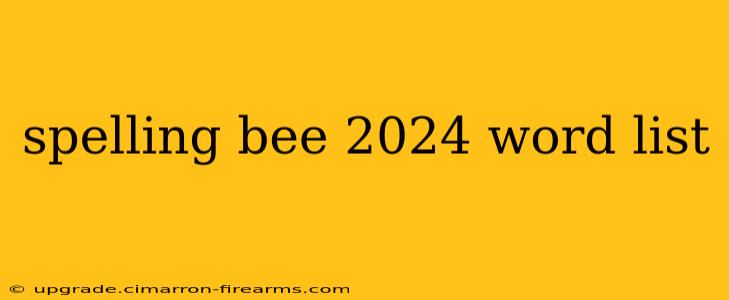The Scripps National Spelling Bee is a highly anticipated annual event, captivating audiences with its challenging words and impressive young spellers. While the official word list for the 2024 Scripps National Spelling Bee remains undisclosed until the competition, this article delves into predicting potential word types, effective study strategies, and valuable resources to help aspiring spellers prepare.
Predicting the 2024 Spelling Bee Word List
Predicting the exact words is impossible, but analyzing past years' lists reveals patterns and trends. The Bee consistently includes words from various linguistic roots, encompassing:
-
Greek and Latin Roots: These form the foundation of many English words. Expect words with prefixes like re-, pre-, un-, sub-, and suffixes like -able, -tion, -ment, -ous. Words derived from Greek words like geo- (earth) or hydro- (water) are also likely candidates.
-
Words with Unusual Spellings or Pronunciations: The Bee often throws curveballs with words that defy typical phonetic rules. These might feature silent letters, unusual letter combinations (like ough), or tricky vowel sounds.
-
Words from Various Subject Areas: The words aren't limited to a single field. Expect vocabulary from science, history, literature, geography, and other academic disciplines. Words related to current events are also possible, though less likely.
-
Increasing Difficulty: As the rounds progress, the complexity of the words significantly increases. Early rounds may feature relatively straightforward words, while later rounds test the spellers' knowledge of obscure vocabulary and nuanced linguistic principles.
Effective Study Strategies for Spelling Bee Success
Preparing for the Spelling Bee requires a multifaceted approach. Here's a breakdown of effective study strategies:
1. Vocabulary Building:
- Consistent Learning: Dedicate time each day to learning new words. Start with simpler words and gradually progress to more complex ones.
- Use Multiple Resources: Employ dictionaries, word lists from previous Bees, flashcards, and vocabulary-building apps.
- Contextual Learning: Don't just memorize spellings; understand the meaning and usage of each word in sentences. This aids memory retention.
- Focus on Roots, Prefixes, and Suffixes: Learning the building blocks of words significantly enhances your ability to deduce spellings.
2. Practice & Techniques:
- Regular Spelling Tests: Regularly test yourself to track progress and identify areas needing improvement.
- Out-Loud Spelling: Practice spelling words aloud to improve pronunciation and identify potential pitfalls.
- Visual Memory: Try visualizing the word's structure as you spell, focusing on letter combinations and patterns.
- Seek Feedback: Ask a teacher, parent, or tutor to review your spelling and pronunciation.
3. Resource Utilization:
- Previous Bee Word Lists: Examining past word lists gives insight into common word origins and difficulty levels.
- Online Resources: Many websites and apps offer spelling bee practice materials and vocabulary lists.
- Dictionaries and Etymology Books: These resources delve deeper into word origins and spellings.
Beyond the Word List: Mastering the Competition
Success in the Spelling Bee isn't solely about knowing the words. Equally important is:
- Calm Demeanor: Managing nerves under pressure is crucial. Practice deep breathing and relaxation techniques.
- Clear Communication: Ensure you understand the pronouncer and ask clarifying questions if needed.
- Strategic Guessing: If uncertain, strategically eliminate unlikely spellings before making a guess.
The 2024 Scripps National Spelling Bee will undoubtedly present formidable challenges. By employing a comprehensive study plan, leveraging diverse resources, and mastering competition strategies, aspiring spellers can significantly improve their chances of success. Remember, consistent effort and a genuine passion for words are key ingredients in the journey to becoming a champion.

